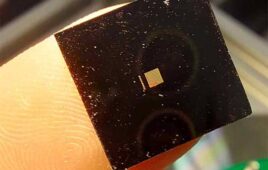
Purdue researchers created wearable technology to help people with swallowing disorders. [Image from Purdue University]
The device is a skin-mountable sensor sticker that is attached to the neck area and connected with small cables to a wireless transmitter unit. The unit then measures and records muscle activity and movement associated with swallowing, The information from the sensor is wirelessly sent to a separate unit that is clipped on the wearer’s shirt that stores the data to be analyzed by a doctor at a later time.
“We want to provide a reliable, patient-friendly and affordable way to treat the millions of people with swallowing disorders,” Georgia Malandraki, an associate professor of speech, language and hearing sciences at Purdue University, said in a news release. “Many device to help these people are expensive, not able to be taken home and no accessible in many rural areas.”
Swallowing requires precise coordination of more than 30 pairs of muscles of the head and neck, six pairs of cranial nerves and the complex circuitry in the brainstem and several brain areas, according to the researchers. A disruption in those pathways can result in swallowing disorders.
“Our device is unique in that we specifically created it to work well with the small and intricate muscles associated with swallowing events,” Chi Hwan Lee, one of the researchers, said. “The sensor sticker is stretchable and flexible to work well with the skin and curvilinear head and neck shape, while the connected unit has electronic chips and more rigid components.”
The sticker sensors are designed as disposable with inexpensive components. They can be used about 10 times before needing to be thrown away.
Researchers Malandraki and Lee have completed pre-clinical tests of the device and are conducting clinical trials. They are working with the Purdue University on patenting their technology.




